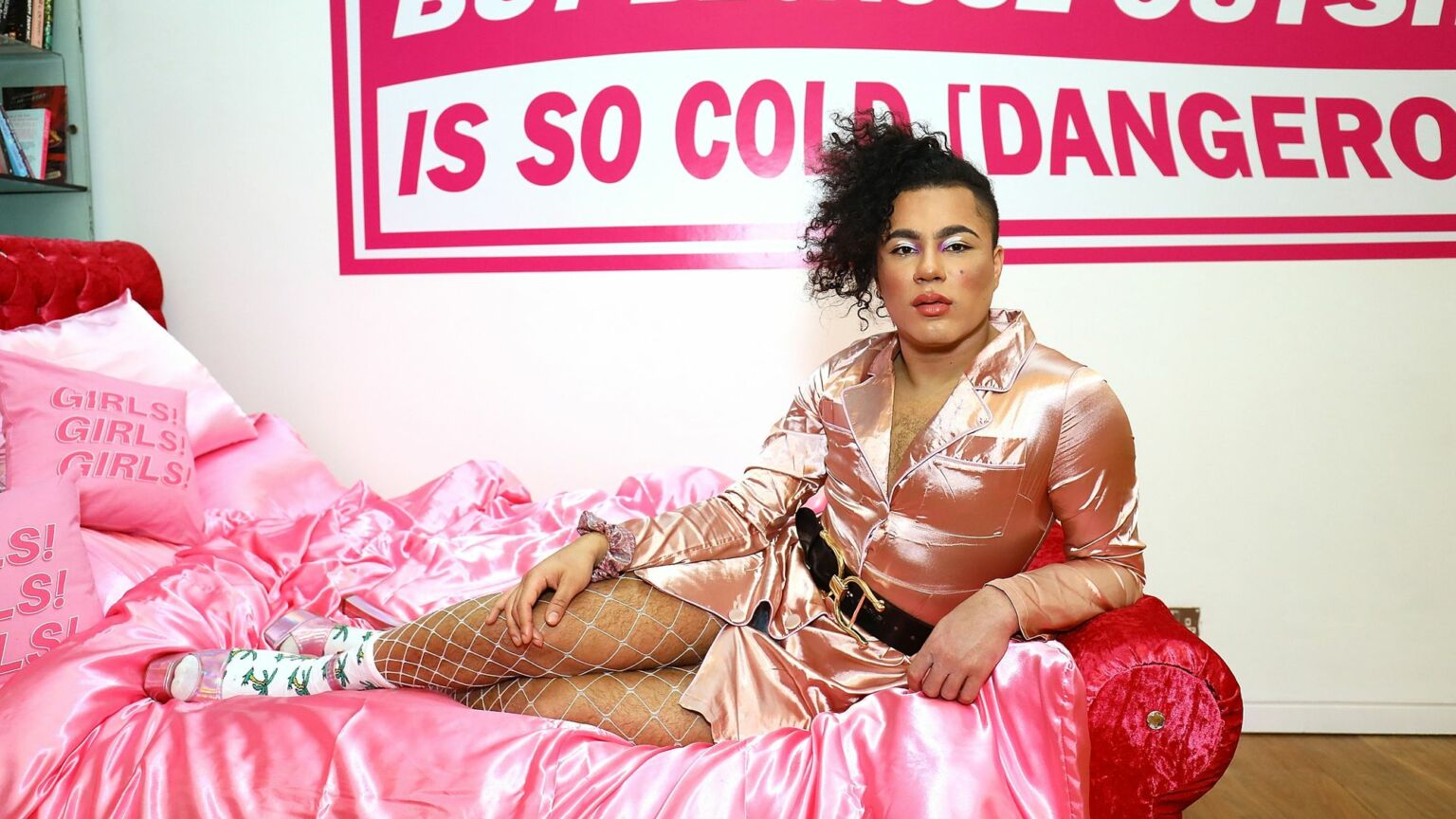
The dangerous narcissism of the trans lobby
Travis Alabanza’s new book shows how male self-pity is weaponised against women’s rights.
Want unlimited, ad-free access? Become a spiked supporter.
Remember when oppression meant the government brutally denying you the rights and freedoms enjoyed by everyone else? Now it means blokes agonising over whether or not to paint their nails. Seriously. In his new book None of the Above: Reflections on Life Beyond the Binary, nonbinary writer Travis Alabanza cites this dilemma as proof of the ‘oppression [of] the gender binary’. He introduces us to Steve, a man who had ‘wanted to paint his nails for years’. But he didn’t because, like the rest of us cis squares, he’d been conditioned into ‘upholding the gender binary’ which says men don’t do that. One day, though, after seeing one of Alabanza’s theatre shows, Steve plucks up the courage to paint his nails neon yellow. Alabanza is moved by this brave strike against the forces of oppression. ‘My urge was to hug him’, he writes. Free at last! Thank God Almighty, free at last!
It’s almost too ridiculous for words. There’s page after page in this memoir-cum-nonbinary-treatise about Steve and his nails. Alabanza refers to the ‘trials’ of Steve, to Steve’s ‘oppression from the gender binary’. Turning the histrionics up to 11, he says he found himself ‘mourning Steve’s lost time’. Just to remind you: Steve wasn’t dead or in jail or under house arrest; he just didn’t paint his nails. That ‘lost time’ Alabanza grieves for is the time Steve didn’t have bright yellow nail polish on. Alabanza laments the pressures of ‘straight culture’ and how it can force poor souls like Steve to ‘spend years in [their] private bedroom’ wondering if they can paint their nails. ‘[How] much freer would we be’, he asks, ‘if we decided to leave [the gender binary]’? Rosa Parks, eat your heart out – you might have taken a seat in the Whites Only section but my boy Steve got his nails done.
The story of Steve’s oppressed unpainted fingernails is only one mad example of gender-binary ‘oppression’ in Alabanza’s book. There’s also the tragic tale of Alabanza feeling he cannot go out in public dressed as a witch. The injustice! ‘[If] I had worn that outfit out on the streets I would have… been punished’, he writes. And if I went to Tesco dressed as a wizard, I’d attract some shouts and jeers, too. Is that oppression? Or how about the time a waiter called Alabanza ‘sir’, which caused his whole body to ‘tense up’? Or the time a doctor looked at Alabanza’s ‘frame’ and said, ‘Yeah, I guess male’? Never mind that Alabanza is male, and thus has a male frame, and thus will be referred to as ‘sir’ by polite waiters – it’s all still ‘systemic oppression’, apparently. Then there’s the terrible act of violence Alabanza experiences. He’s out and about in ladies’ clothing when someone throws a chicken burger at him, ‘in broad daylight’ no less. Now, having food chucked at you is not nice. I once had a portion of chips dumped on me on the night bus to Camberwell. But it’s not oppression, is it? It’s just life in a city that has an abundance of both fast food and drunk young people. And yet Alabanza has written an entire play about the burger incident, called Burgerz, and he mentions it frequently in this new book. You’d think it was a lynching.
This is meant to be a book about what it means to be nonbinary. Alabanza is a writer and performer who identifies as neither male nor female and goes by the pronoun ‘they’. (I don’t use the ‘they’ pronoun. I didn’t spend years being taught good grammar by severe nuns only to discard it all in my middle age.) But actually, the book doesn’t shine much light on what ‘nonbinary’ means, except that it apparently involves being a ‘gender fucker’ who lives ‘outside the binary’ and is determined to ‘reclaim an autonomy over your body that was stripped from you at birth’. Yes, that’s right: the midwife who says ‘It’s a boy!’ or ‘It’s a girl!’ is part of the oppressor class. She’s the first oppressor in your life, in fact, ruthlessly robbing you of your right to gender self-determination with her arrogant decree that if you have a penis you’re a boy and if you have a vagina you’re a girl. Such declarations of sex are ‘non-consensual’, says Alabanza. True freedom is asking wailing newborn babes if they consent to being called male or female.
What the book does do, however – unwittingly, of course – is expose the colossal levels of self-regard and self-pity in the trans movement. The oppression fantasies of this identitarian group are extraordinary. Alabanza says he and others like him live in ‘danger’. You never know ‘what shape that danger will take’, he says. State violence? Imprisonment for your beliefs? Nope – the danger could be a ‘whisper in the street’ or ‘a news presenter mocking your appearance’. Oh, get a grip. Alabanza, by his own admission, dresses like a ‘kindergarten teacher on acid’. Of course people are going to whisper. It is a testament to the narcissism of trans activists that they think they should be able to go out in ridiculous clobber, big blokes in neon mini-skirts and teetering high heels, without anyone so much as murmuring about them. Alabanza writes of his horror at being branded a ‘man in a dress’. I’m sorry but it is not oppression to refer to a man in a dress as a man in a dress.
There is a striking double standard in Alabanza’s talk of ‘danger’. One of the things he’s best known for is kicking up a fuss a few years ago when he was refused entry to the female changing room at Topshop in Manchester. The shop assistant quite properly told this man in a dress to go upstairs to Topman and use the male changing room. Alabanza went mad. Topman? How dare the sales girl oppress him like that. He tweeted about this terrible act of ‘transphobia’ and said to Topshop: ‘Who made you in charge of deciding who is woman enough to use your changing room?’ There was a media storm and Topshop caved – it said all its changing rooms would be ‘gender-neutral’ from now on. Tough shit all you teenage girls who liked having a female-only space in which you could try on outfits with friends. Mr Alabanza needs his nonbinary delusions to be publicly validated and as a result any old bloke can now enter your once sacrosanct space. One man’s therapeutic needs taking precedence over the right to privacy of thousands and thousands of girls – show me a better example of ‘male privilege’.
Here’s what’s remarkable, though – Alabanza says in his book that the reason he couldn’t go into the ‘male changing rooms’ is because it would be an ‘unsafe place to change’. The men in there would pose a threat to him; he would be ‘at risk from harassment’. So the solution is to make all spaces ‘gender-neutral’ and allow those same men you fear to go anywhere they like, including into the girls’ changing room? The arrogance of this position, the narcissism of it, is astonishing. What about the possibility that a group of 13-year-old girls in a state of undress will feel ‘unsafe’ if a 20-year-old bloke is in the cubicle next to them? What about their ‘risk from harassment’? Doesn’t matter. Suck it up, girls. Your loss of privacy and security is a small price to pay for Mr Alabanza having his silly belief that he’s neither male nor female validated in the public square.
And if you criticise Alabanza’s Topshop crusade, if you say it’s wrong and weird for burly males to intrude on girls’ spaces, guess what you’ll be accused of? Yep, oppression. Even violence. Janice Turner of The Times wrote about the Topshop incident. She said it was an example of children’s safety being ‘sacrificed to appease the trans lobby’. Alabanza devotes an entire chapter in his book to wailing over Turner’s column. Apparently reading it was ‘one of the most traumatic’ experiences of his life. Turner’s words were ‘violence washing over me’, he says. This is such gaslighting. So Alabanza can insist on his right to go into a girls-only space and can call Topshop ‘shit’ and ‘transphobic’ for refusing to allow him to do so, and that’s legitimate commentary. But if a woman says ‘What about the rights of girls?’, that’s violence? When the man speaks it is pure reason; when the woman dissents it is dangerous. Sexism 101.
Alabanza goes on and on about ‘violence’. He doesn’t mean violence as the rest of us understand it (unless you count the chicken-burger incident, which I guess was a tiny bit violent). No, he means disagreement, criticism, people being disapproving of his nonbinary nonsense. He even describes birth as violent – for him, of course, not his mother. The ‘first violence [is] birth’, he writes, ‘in which a doctor looks at you and decides who you are based on your external organs’. Science is violence! Pity the poor mothers who went through the trials of labour and child-rearing only to have their grown-up nonbinary offspring tell them how violent it was to be born. That Alabanza’s book has come out at the same time as Salman Rushdie was stabbed in the neck for writing a novel is noteworthy. That is violence, Travis. Someone saying ‘Is that a bloke?’ as you walk down the street dressed like a kindergarten teacher on acid is not.
The book confirms just how phoney ‘trans liberation’ is. Alabanza presents himself as an escapee of the gender binary, one of the ‘lucky’ ones who has reached the enlightened heights of ‘gender non-conformity’. In truth, he seems trapped in a gender prison. He seems to think about nothing but gender. Gender, to him, feels like an ‘internal neverending monologue’. It’s like he lives in an intellectual cell of his own making. This isn’t liberty, it’s a kind of pathology. Where the rest of us are at ease with our sex, trans activists seem to require ceaseless discussion and validation and worship of their constantly shifting gender beliefs. They think we cis plebs are slaves to the gender binary, when in truth it is they who have made themselves slaves to gender ideology.
This is narcissism, in the truest meaning of the word. Narcissism isn’t egotism. It doesn’t necessarily mean having an overblown view of how wonderful you are. Rather, as Christopher Lasch had it, ‘the narcissist depends on others to validate his self-esteem. He cannot live without an admiring audience.’ The narcissist is beset by ‘insecurity’, said Lasch, such that he must always see ‘his “grandiose self” reflected in the attentions of others’. This is what lies behind Alabanza’s disgraceful Topshop stance; and the constant insistence of ‘transwomen’ (men) that they should have the right to enter women’s spaces; and the subjugation of language itself to the new gender ideology, so that mothers become ‘birthing parents’ and breastfeeding becomes ‘chestfeeding’ and the category of women is increasingly being replaced by the category of ‘women and nonbinary people’ – which basically means ‘women and men’, which basically means women are no longer permitted to have any space that is theirs alone. What lies behind all of this is the insistence of the narcissist that he always see himself reflected in the attentions of others. That his self-image be continually validated by society. That no space may exist that does not conform to, and flatter, his ‘grandiose self’. Changing rooms for girls? No way. Such spaces implicitly call into question the gender narcissist’s fantasy that he is post-sex and thus they cannot exist. Destroy them.
‘For the narcissist, the world is a mirror’, said Lasch. This is what is happening with the trans ideology: it is trying to turn every part of the world into a mirror that faithfully and uncritically reflects the new gender beliefs. And it seems that no collateral price is too high in the pursuit of this most narcissistic of projects. Women’s spaces, girls’ changing rooms, lesbian rights, the English language, scientific truth itself – all may be cast aside in the name of male narcissism; all may be sacrificed at the altar of gender ideology. This, I suspect, is why Alabanza was so traumatised by Janice Turner’s use of the word ‘sacrifice’. Because, deep down, he knows it’s true. He knows a great number of good and important things are indeed being sacrificed to his vain, untrue belief that he is neither male nor female.
That Topshop assistant who refused Alabanza entry to the girls’ changing rooms was not a ‘transphobe’ – she was a hero. In her own way she was standing up, not only for the girls inside that space, but also for the reality of sex, for truth. It was Alabanza who was the oppressor, demanding dominion in other people’s territory, while the sales assistant was defending freedom: the freedom of association of women and girls. Society may have lost its bottle when it comes to maintaining borders and recognising binaries and defending scientific truth, but she hadn’t. We need more people like her, more people willing to say to men in dresses: ‘You’re not allowed in here. Get out.’
Brendan O’Neill is spiked’s chief political writer and host of the spiked podcast, The Brendan O’Neill Show. Subscribe to the podcast here. And find Brendan on Instagram: @burntoakboy
Picture by: Getty.
You’ve read 3 free articles this month.
Support spiked and get unlimited access.
Help us hit our 1% target
spiked is funded by readers like you. It’s your generosity that keeps us fearless and independent.
Only 0.1% of our regular readers currently support spiked. If just 1% gave, we could grow our team – and step up the fight for free speech and democracy right when it matters most.
Join today from £5/month (£50/year) and get unlimited, ad-free access, bonus content, exclusive events and more – all while helping to keep spiked saying the unsayable.
Monthly support makes the biggest difference. Thank you.

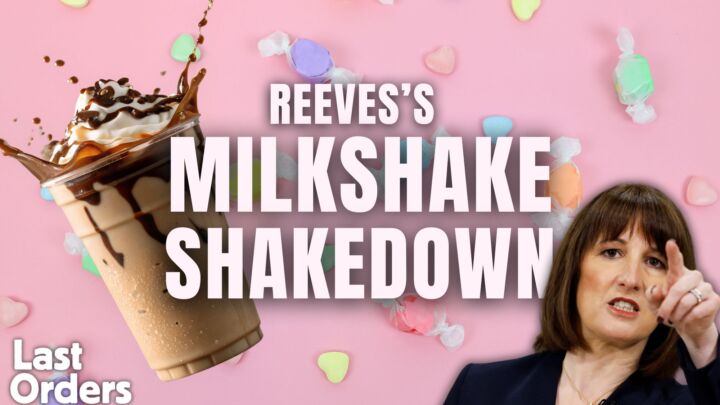


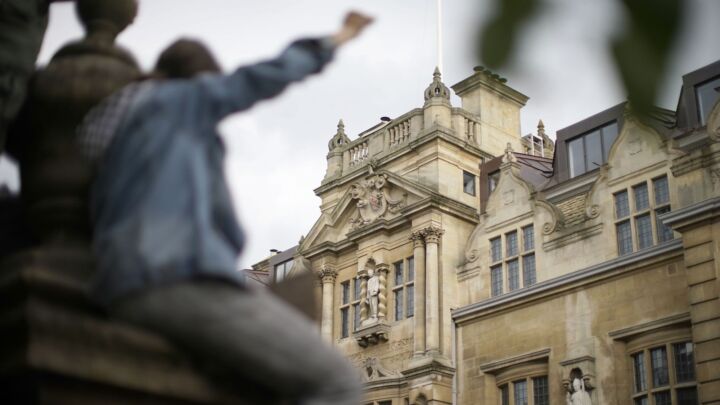


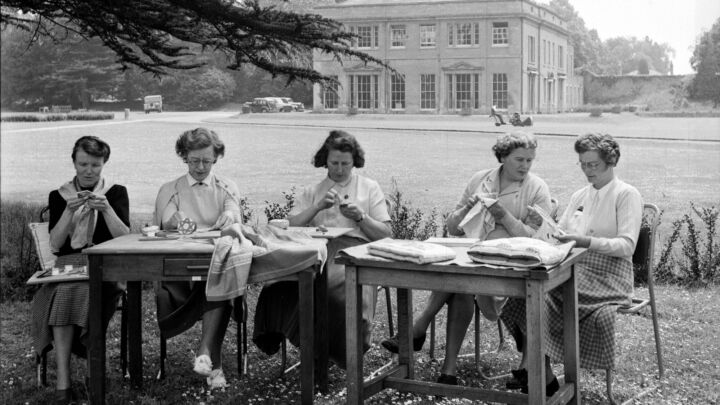

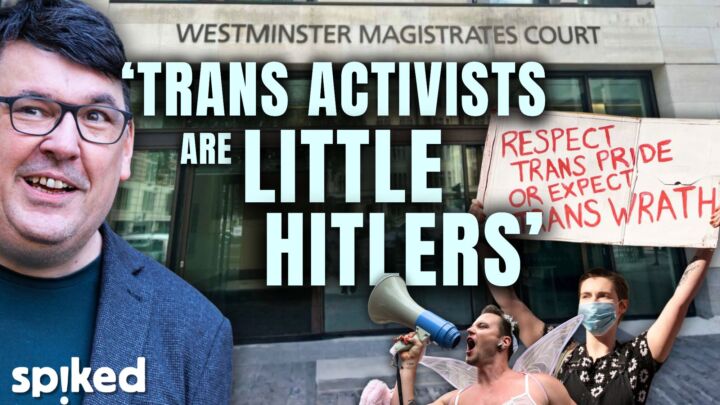

Comments
Want to join the conversation?
Only spiked supporters and patrons, who donate regularly to us, can comment on our articles.